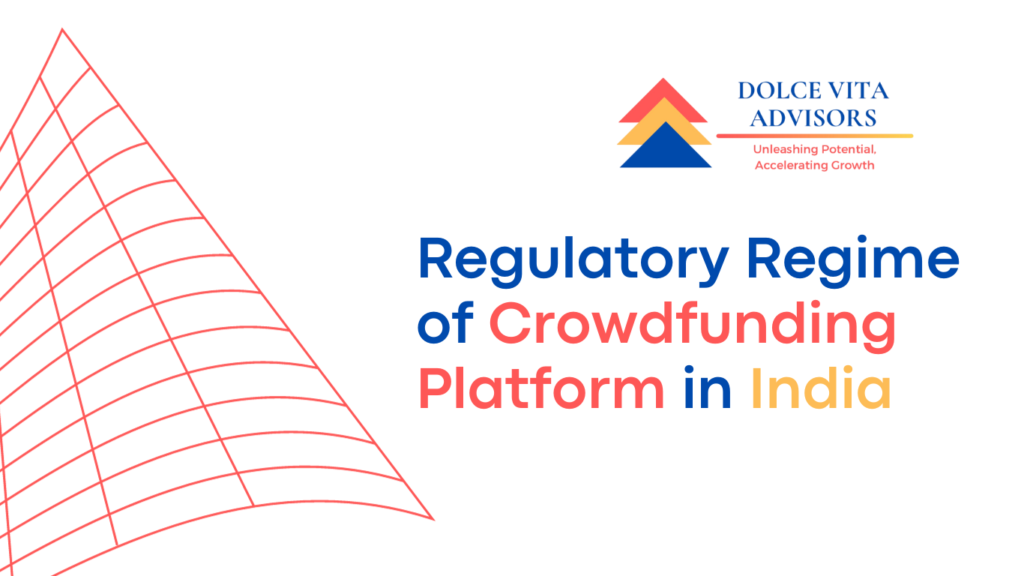
Insights by: Sumit Kochar, Shivam Gera & Jaydeep Saha
REGULATORY REGIME OF CROWDFUNDING PLATFORM IN INDIA
Introduction
Crowdfunding has emerged as a popular and innovative method for raising funds across the globe. It involves raising capital from a large number of individuals to finance projects, ventures, businesses, or charitable causes. Traditionally, crowdfunding was carried out through subscriptions, benefit events, and door-to-door fundraising. However, with the advent of online platforms, crowdfunding has gained widespread popularity and accessibility.
In this article, we will explore the various types of crowdfunding, its legal implications in India.
What is Crowdfunding?
Crowdfunding is the practice of soliciting funds, typically in the form of relatively small monetary contributions, from a large number of individuals or investors through online platforms or social networking sites. These funds are collected to support a specific project, business venture, or social cause. Crowdfunding harnesses the collective financial support of a diverse group of people, often referred to as backers or contributors, to help bring an idea, initiative, or endeavour to fruition. This approach is facilitated by web-based platforms and social media, which provide a digital infrastructure for creators and entrepreneurs to present their proposals and attract financial support from a wide audience. Crowdfunding has gained popularity as an alternative method of financing projects and ventures, offering opportunities for individuals and organizations to access capital and engage with their supporters directly.
Crowd sourced funding is a means of raising money for a creative project (for instance, music, film, book publication), a benevolent or public-interest cause (for instance, a community based social or co-operative initiative) or a business venture, through small financial contributions from persons who may number in the hundreds or thousands. Those contributions are sought through an online crowd-funding platform, while the offer may also be promoted through social media.[1]
Types of Crowdfunding
Crowdfunding can be broadly categorized into four main types:
- Loan-Based Crowdfunding (Peer-to-Peer Lending): Involves individuals lending money to businesses or individuals in exchange for interest payments and the repayment of the principal amount over time.
- Investment-Based Crowdfunding: Allows individuals to invest directly or indirectly in new or established businesses by purchasing shares, debt securities, or units in investment schemes.
- Donation-Based Crowdfunding: Involves people making donations to individuals, organizations, or enterprises without expecting any financial return.
- Pre-Payment or Rewards-Based Crowdfunding: Contributors provide funds in exchange for rewards, products, or services, such as concert tickets, artwork, or new products.
Taxation of Crowdfunding in India.
Under current Income Tax regulations, non-profit organizations using crowdfunding platforms are exempt from taxation. However, individuals receiving donations on such platforms are subject to income tax liabilities. Donors may be eligible for tax benefits when contributing to approved charitable organizations under section 80G of the Income Tax Act, 1961.
Foreign Contribution Regulation Act, 2010 (“FCRA”) is a law that regulates incoming foreign aid or contributions in India. When individuals intend to raise funds through crowdfunding platforms and are considering accepting contributions from foreign citizens, it is imperative that they obtain an FCRA certificate. While crowdfunding can be an effective means to support noble causes, it is crucial to exercise caution and compliance when accepting contributions from outside India.
The FCRA certificate is a legal requirement in India for organizations and individuals that intend to receive foreign contributions. It ensures transparency and accountability in the receipt and utilization of such funds. Without the appropriate FCRA certification, accepting foreign contributions can lead to legal implications, including potential issues during the income tax return filing process.
Regulatory Regime of Crowdfunding Platform in India
In India, crowdfunding has gained momentum, offering an efficient way to raise funds for various purposes, both personal and charitable. The tax benefits associated with donations made through crowdfunding have encouraged individuals to support causes they believe in. There are three primary types of crowdfunding in India on which the regulatory regime of crowdfunding in India works are:
- Donation-based crowdfunding: This form of crowdfunding operates on a non-investment basis, wherein individuals make donations without any expectation of financial returns. While it inherently lacks financial returns, a regulatory framework has been established by the Securities and Exchange Board of India (SEBI) through the “Framework on Social Stock Exchange” vide Circular No. SEBI/HO/CFD/PoD-1/P/CIR/2022/120[2] to govern donation-based crowdfunding for social enterprises. This regulatory framework encourages social enterprises to align with the social stock exchange framework.
- Peer-to-peer lending: This type of crowdfunding connects lenders with borrowers through online platforms, facilitating unsecured loans or financial assistance. Due to potential risks associated with this model, India has established a regulatory framework overseen by the Reserve Bank of India (RBI) through the “Master Directions – Non-Banking Financial Company – Peer to Peer Lending Platform (Reserve Bank) Directions, 2017” vide Notification No. RBI/DNBR/2017-18/57.[3] This framework aims to prevent unhealthy practices and ensure responsible lending.
- Securities-based or equity-based crowdfunding: This form of crowdfunding, as a means of raising capital and involving the issuance of securities, poses noteworthy regulatory challenges. The Sahara case, mentioned below, underscores the necessity for stringent regulations in this crowdfunding domain. Notably, many crowdfunding platforms, whether fintech or otherwise, engage in capital-raising activities for the companies they host through private placements under the Companies Act, 2013. These provisions of private placement are mentioned in Section 42 of the Companies Act, 2013 and the Companies (Prospectus and Allotment of Securities) Rules of 2014.
In accordance with Section 42 of the Companies Act, 2013, first, the private placement limits the offer or invitation to subscribe to securities to a maximum aggregate of 200 individuals in a financial year. Second, it strictly prohibits any public advertisements or utilization of media, marketing, or distribution channels to disseminate information to the general public about such security offerings. Lastly, private placement stipulates that the offer can solely be extended to individuals specifically identified by the company before initiating the subscription offer.
In a landmark decision, the Hon’ble Supreme Court of India directed the Sahara Group, comprising Sahara India Real Estate Corporation Limited (SIRECL) and Sahara Housing Investment Corporation Limited (SHICL) (“Sahara Case”)[4], to refund approximately Rs. 17,400 crores to their investors within three months, accruing a 15% interest rate. In this case, Sahara issued Optionally Fully Convertible Debentures through bypassing the provisions of Section 42 of the Companies Act, 2013. The issue was offered to millions of investors under the umbrella of private placement which was not the case as a company cannot offer to more than 200 persons under private placement. After the said judgment, India has banned equity-based crowdfunding.
If a start-up intends to raise capital on crowdfunding platforms by way of private placement, this would not be possible at all for the following reasons –
- Private placement mandates the pre-identification of investors, a condition that does not align with the typical modus operandi of crowdfunding platforms.
- Private placement unequivocally bars public advertisement of security offerings, whereas crowdfunding platforms typically employ widespread marketing strategies to engage the public.
- The private placement norms impose a strict cap of 200 individuals for security issuance in a financial year, rendering crowdfunding platforms incompatible with this restriction.
These constraints are not novel and have been inherent in private placement norms. Recent rulings by the Registrar of Companies (ROC) have shed further light on these issues, exemplified by the case of Anbronica Technologies Private Limited and Septanove Technologies Private Limited (“Companies”).
The background of the case is Tyke is a technology-based community platform (“Tyke”) which enables companies seeking investment to run a fundraising campaign on the platform to connect with potential investors registered on Tyke (“Tyke Members”). Such Tyke Members may comprise of professionals, corporate executives and individuals looking to make investments. Tyke also provides certain other services to facilitate the campaign and charges a fee from the companies for the usage of the platform. The Companies had initiated fund raising campaigns on Tyke. Pursuant to communication of interest from certain Tyke Members, the Companies issued and allotted compulsorily convertible debentures (“CCDs”) to about 28 and 196 such members on a private placement and preferential basis raising approximately INR 12,50,000 and INR 32,51,000.
The ROC issued a show-cause notice, arguing that the issuance and allocation of CCDs by the Companies to Tyke Members violated Section 42 of the Companies Act, 2013. The Companies clarified that Tyke was only used by them as a platform for garnering interests from Tyke Members. Tyke was not used to invite the public to subscribe to securities of the Company nor to inform the public at large about the private placement offer being issued by the Company. Tyke underscored that its terms of use placed the onus of compliance with statutory provisions on the companies using the platform for fundraising.
As per the observations, the ROC held that platforms like Tyke effectively violated Section 42(7) of the Companies Act, 2013 by noting that Tyke cannot be relegated to a mere intermediary, but instead it was an active facilitator allowing the companies to raise investments through its portal and it is providing end-to-end services to the companies. Section 42(7) of the Companies Act, 2013 explicitly prohibits public advertisements, media usage, marketing channels, or agents for disseminating information about securities issuance. The ROC rejected the argument that Tyke was a mere intermediary, asserting that it provided end-to-end services for companies. Additionally, the ROC maintained that the limit of 200 persons extended to both the number of subscribers and the audience for offer or invitation to subscribe, precluding crowdfunding platforms from complying.
The ROC’s order found the Companies in violation of Section 42 and imposed penalties on the Companies, its directors and promoters as per Section 42(10) of the Companies Act, 2013. However, the penalty was reduced to INR 1 lakhs from 2 lakhs pursuant to Section 446B of the Companies Act, 2013, due to their classification as “small companies” under the Act. Importantly, the ROC acknowledged Tyke’s role in facilitating the default but refrained from prosecuting Tyke, as Section 42 of the Companies Act, 2013 does not prescribe penalties for entities beyond the company, its promoters, and directors.
Notably, the SEBI has also recognized the private placement challenges in securities-based crowdfunding. SEBI’s consultation paper on crowdfunding[5] proposed allowing crowdfunding solely for ‘accredited investors,’ encompassing companies incorporated under the Companies Act with a minimum net worth of Rs 20 crore, High Net Worth Individuals (“HNIs”) with a minimum net worth of Rs 2 crore, and Eligible Retail Investors meeting prescribed criteria. SEBI further recommended to place certain restrictions on the kind of companies which can raise funds through the Security based crowdfunding. These restrictions are given as follows:
- A company which is intending to raise capital should not be exceeding a maximum limit of Rs 10 Crore in a period of 12 months.
- A company which is should not be promoted, sponsored or related to any industrial group which has a turnover of more than Rs 25 Crore.
- The company should not be listed on any exchange.
- A company should not be more than 4 years old in incorporation.
- The company should not be engaged in real estate business and other activities which are not permitted under industrial policy of Government of India.
Risks Associated with Crowdfunding
- Substitution of Institutional Risk with Retail Risk: Presently, the risk associated with financing Start-ups and Small and Medium Enterprises (“SMEs”) primarily rests with Venture Capital Funds (“VCFs”) and Private Equity (“PE”) Investors. In crowdfunding, these entities seek investments in smaller amounts from a large number of investors. This shifts the risk-taking responsibility from informed VCF/PE investors to retail investors, who often possess a lower risk tolerance. Retail investors may struggle to comprehend the inherent risks in these investments and may not be financially equipped to withstand potential losses. This is especially concerning because investments in SMEs and Start-ups are inherently high-risk, low-liquidity, and typically viewed as aggressive, long-term investments. Unlike VCF/PE Investors, crowdfunding investors lack the ability to negotiate favourable terms or influence management decisions due to their smaller contributions. Consequently, uninformed and unsophisticated retail investors may exhibit herd behaviour.
- Risk of Default: In crowdfunding, there is limited recourse available to investors in cases of issuer default or fraud. Funds are not directly sought by the issuer, and they do not provide a formal offer document. Instead, platforms solicit funds on behalf of issuers, with varying degrees of due diligence. If a crowdfunding platform faces temporary or permanent closure, investors have no recourse. Unlike corporate bonds. Public funding is often based on future prospects rather than clear evidence of a viable business model, increasing the risk of failure for equity investors. The risk of failure is exacerbated by the potential participation of investors lacking the skills and experience to assess risks compared to traditional investors like VCF/PE investors, banks, or financial institutions.
- Risk of Fraud: Crowdfunding exposes investors to the risk of fraud, with genuine websites potentially being exploited by fraudsters who claim to be project promoters or the creation of false websites to deceive investors or acquire sensitive information like credit card details. Thus, there is a risk of misuse, cyber-security breaches, and identity theft.
- Central Role of the Internet: Crowdfunding platforms operate as internet-based marketplaces for issuers to sell securities and raise capital. This reliance on the internet increases the potential reach of crowdfunding, surpassing traditional fundraising methods. Younger investors, in particular, may be influenced by social media and internet trends. Additionally, funds can be raised from investors residing in various countries without adherence to local jurisdictional laws.
- Systemic Risk: Crowdfunding poses systemic risks due to several factors. First, the individualized nature of crowdfunding can lead investors to overlook diversification principles, potentially concentrating their investments in a single, high-risk venture. Second, the absence of a secondary market for selling investments may result in illiquidity, making it challenging for investors to exit their positions. Third, money laundering risks are a concern, as the online nature of crowdfunding platforms can facilitate illicit financial activities. Fourth, the rapid growth in peer-to-peer lending within crowdfunding could expose the financial sector to default risks similar to those experienced during the subprime mortgage crisis. Lastly, the cross-border nature of crowdfunding can create complications, as differing legal frameworks and securities laws across jurisdictions may pose challenges for regulatory oversight and investor protection.
- Information Asymmetry: Information asymmetry is a prevalent issue within crowdfunding platforms and contributes to several risks. Firstly, some investors may act on undisclosed information, potentially gaining unfair advantages. Secondly, there is limited monitoring of how invested funds are allocated, raising concerns about their proper use. Thirdly, issuers often lack transparency and reporting obligations, especially regarding the utilization of raised funds, leaving investors with incomplete information. Lastly, the potential for omission of critical information and misinformation can distort investors’ perceptions, leading to overestimation of expected returns and potentially driving them to make inappropriate investment choices. These information-related risks highlight the need for enhanced transparency and oversight in crowdfunding activities.
- Substitution of Existing Regulatory Framework: Crowdfunding platforms often operate without conforming to the stringent requirements imposed on banks or traditional public offerings. They do not match the level of disclosure and due diligence associated with filing a Prospectus for public offerings, which undergo regulatory scrutiny. Additionally, certain public issue requirements like a track record for issuers, minimum promoter contributions, lock-in periods, and trustee involvement for debt securities may not apply to crowdfunding platforms. Even recent private placement regulations, such as the requirement for a Private Placement Offer Letter and limitations on the number of investors, may not be applicable to crowdfunding platforms.
Conclusion
In conclusion, crowdfunding has arisen as a substantial and multifaceted fundraising mechanism within the jurisdiction of India. It encompasses a plethora of classifications and associated regulatory nuances. This modality harnesses the amalgamated financial backing of individuals to underwrite diverse undertakings, business ventures, or benevolent endeavours. Nonetheless, as the crowdfunding arena matures, it concurrently proffers opportunities and perils that necessitate judicious handling.
This discourse delves into the intricate regulatory framework governing crowdfunding within the purview of India. It meticulously delineates the specific statutes and authoritative bodies entrusted with overseeing donation-driven crowdfunding, peer-to-peer lending, and securities-centric or equity-based crowdfunding. It is noteworthy to mention that this exposé references the proscription of equity-based crowdfunding subsequent to the Sahara case, predicated upon regulatory contraventions.
The risks concomitant to crowdfunding, encompassing the perils associated with retail investors, defaults, fraudulent activities, and the asymmetry of information, are exhaustively examined. This accentuates the imperative of instituting measures for safeguarding investors and the concomitant necessity of vigilant supervision.
Crowdfunding platforms, by and large, operate extrinsically to the conventional regulatory paradigm, which may pose impediments to enforcing adequate disclosure requirements and performing due diligence in a comprehensive manner. Crowdfunding has crystallized as a valuable fundraising instrument within the Indian milieu. Nevertheless, it is encumbered with legal and regulatory intricacies that demand meticulous scrutiny and adherence.
As the crowdfunding milieu continues its evolutionary trajectory, it is incumbent upon regulators and stakeholders within the market ecosystem to harmoniously collaborate, thus attaining a judicious equilibrium between nurturing innovation and ensuring the safeguarding of investors’ interests.
[1]http://ict-industry-reports.com.au/wp-content/uploads/sites/4/2013/09/2013-Crowd-Sourced-Equity-Funding-Discussion-Paper-Australia-CAMAC-Sept-2013.pdf
[2] https://www.sebi.gov.in/legal/circulars/sep-2022/framework-on-social-stock-exchange_63053.html
[3] https://www.rbi.org.in/Scripts/BS_ViewMasDirections.aspx?id=11137
[4] Sahara India real estate corporation limited v. SEBI (2012) 115 SCL 478
[5] https://www.sebi.gov.in/sebi_data/attachdocs/1403005615257.pdf

